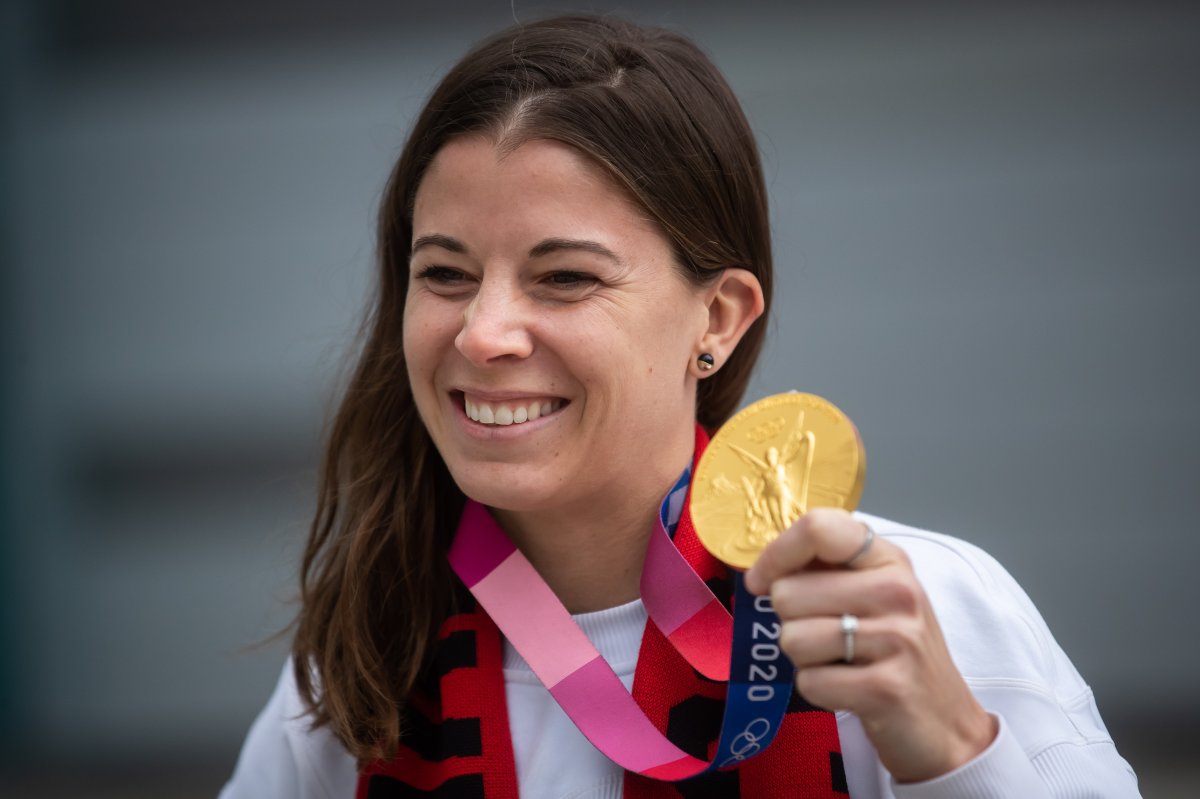It’s like a heartbeat. That’s how Special Olympics Team Canada athlete Tyra Flukinger describes the acoustics of a basketball court.

“We’re all dribbling, shooting… it’s like a heartbeat, like drums to me,” she told Global News.
Flukinger is currently in Berlin, Germany for the 2023 Special Olympics World Games, which marks a return to the international competition since the previous Games in 2019.
The World Games are different from the Paralympics that run alongside the Olympics. Think of them as the World Athletic Championships — one of the highest levels of athletic competition possible.
A total of 89 athletes will be representing Canada at the World Games, which run between June 17 to June 25. Athletes will be competing in nine sports including athletics, basketball, bocce, tenpin bowling, golf, powerlifting, rhythmic gymnastics, soccer and swimming.
Flunkinger is joined in Berlin by Special Olympics Canada honorary coach Stephanie Labbé, who holds an Olympic gold medal as goalkeeper for Canada’s national women’s soccer team. She is also the general manager of women’s soccer for the Vancouver Whitecaps.
The World Games are the flagship event for Special Olympics and take place every two years, alternating between the summer and winter games.
This year brings a bunch of new beginnings for the Special Olympics movement. The Berlin competition will be the first World Games since 2019, due to the pandemic. Team Canada is also debuting their first all-women’s soccer and basketball teams in Berlin.
“Even though we’ve only known each other for a few months, we call each other family,” Flunkinger said, referring to her basketball team. Although she has been playing with Special Olympics Canada for eight years, this is her first time participating in the World Games.
The selection process for World Game athletes was different this year as well. Instead of earning a spot based on 2022 Summer Games, which did not occur, athletes were picked from across the country based on registration at each provincial/territorial chapter. It means many team members had never been acquainted prior to World Games training camps began, and will be competing together for the very first time in Berlin.
Because of the pandemic, it’s also many Special Olympics athletes’ first time playing on the international stage. That’s why Labbé says a big part of her role at the games this year will be cheering her team on every step of the way.
“I think it’s about reminding these athletes that they’re here for a reason and they’re good enough,” said Labbé, who was selected as honorary coach in November last year. “The best outcome that they could have is that they have fun, they enjoy it, and they make new friends.”

Special Olympics was founded in 1968 and offers year-round sports training and athletic competition in a variety of sports across age groups. Labbé said a factor in why she took on the new role is because she believes in the importance of providing inclusive opportunities for Canadians with intellectual disabilities.
“I think it’s important that (Special Olympics athletes) know as human beings, as athletes, that they are worth the same as anybody else, that they matter just the same and that they can have the same opportunities that anybody else can have,” Labbé said.
Phil Brown has been a powerlifter with Special Olympics Canada for 31 years. Last year on his 30th anniversary with the organization, he found out he was joining Team Canada for the first time at the Berlin World Games.
“I just cried,” Brown said to Global News.
The 55-year-old athlete stands at five-foot-five inches and 138 pounds, yet he can deadlift almost three times his weight.
Brown, who is from Nova Scotia, has been to 11 national competitions for a number of different sports. He has approximately 200 medals from Special Olympics competitions, which he keeps in a jar at home, but says there’s still room for a few more.
Brown grew up in foster care and faced years of bullying before being discovered at age 17 by powerlifter Debbie Key, who became his first gym coach.
“I try not to reflect on what happened. I went through something no kid should go through,” he said. “So you could say powerlifting saved my life… and Special Olympics is deep in my heart.”

A recent Canadian study published in December, 2022 found that participation in Special Olympics reduces the risk of depression in young adults with intellectual disabilities.
The study, published in December in a medical journal titled the Social Psychiatry and Psychiatric Epidemiology, noted that the combination of physical activities and the social connectedness of “being part of a team” helps lower the risk of being diagnosed with depression as a young adult.
But Labbé says there are still barriers to overcome to make sports more accessible for people with intellectual disabilities — a fight that the Special Olympics World Games puts in the spotlight.
“Everybody deserves to have the chance to travel the world, to compete in sport, to push themselves, to meet new people and to learn all of the things that sport can teach us,” she said. “I think everybody deserves that opportunity.”




Comments